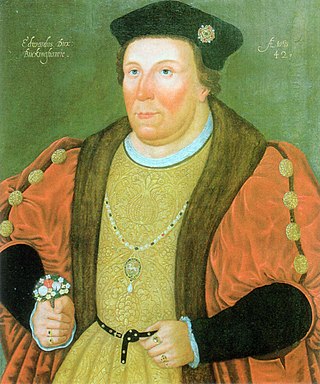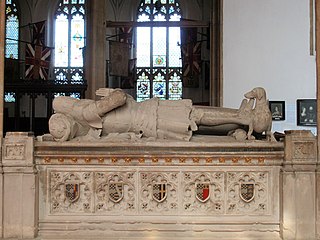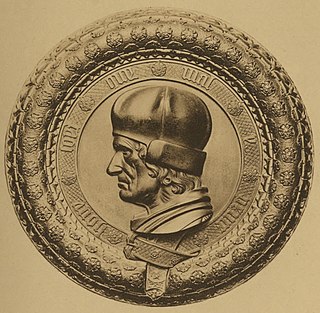Related Research Articles

Edward Stafford, 3rd Duke of Buckingham was an English nobleman. He was the son of Henry Stafford, 2nd Duke of Buckingham, and Katherine Woodville, and nephew of Elizabeth Woodville and King Edward IV. Thus, Edward Stafford was a first cousin once removed of King Henry VIII. He frequently attended the courts of Henry VII and Henry VIII. He was convicted of treason and executed on 17 May 1521.
Arthur Plantagenet, 1st Viscount Lisle, KG was an illegitimate son of the English king Edward IV, half-brother-in-law of Henry VII, and an uncle of Henry VIII, at whose court he was a prominent figure and by whom he was appointed Lord Deputy of Calais (1533–40). The survival of a large collection of his correspondence in the Lisle Letters makes his life one of the best documented of his era.

Sir Robert Drury (1456–1536) was an English knight, Lord of the Manor of Hawstead, Suffolk, and Knight of the Body to Kings Henry VII and Henry VIII. As a politician he was Knight of the Shire for Suffolk, Speaker of the House of Commons, and Privy Councillor. He was also a barrister-at-law. His London townhouse was on the site of today's Drury Lane.
Sir Robert Bell SL of Beaupré Hall, Norfolk, was a Speaker of the House of Commons (1572–1576), who served during the reign of Queen Elizabeth I.

The Barons of the Exchequer, or barones scaccarii, were the judges of the English court known as the Exchequer of Pleas. The Barons consisted of a Chief Baron of the Exchequer and several puisne (inferior) barons. When Robert Shute was appointed second baron in June 1579 the patent declared "he shall be reputed and be of the same order, rank, estimation, dignity and pre-eminence to all intents and purposes as any puisne judge of either of the two other courts." The rise of commercial trade in Elizabethan England occasioned fraudulent application of the Quo minus writ. More taxation demanded staff at the exchequer to sift an increase in the case load causing more widespread litigation cases to come to the court. From the 1580s onwards the Barons of Exchequer were no longer held in such low regard, and more likely to be Serjeants-at-law before qualification. The Inns of Courts began to exclude solicitors, and held posts for judges and barons open equally to barristers. In 1591, Regulations reflected a case in which the Lord Keeper Egerton banned solicitors from seeking cases in the Exchequer.
Andrew Windsor, 1st Baron WindsorKB (1467–1543), was a Member of Parliament, English peer, and Keeper of the Wardrobe, knight banneret and military commander.

Sir Thomas Richardson of Honingham in Norfolk, was an English judge and politician who sat in the House of Commons from 1621 to 1622. He was Speaker of the House of Commons for this parliament. He was later Chief Justice of the Common Pleas and Chief Justice of the King's Bench.

Sir Thomas Lovell, KG was an English soldier and administrator, Speaker of the House of Commons, Secretary to the Treasury and Chancellor of the Exchequer.
Sir Richard Lyster was an English judge and Chief Justice of the King's Bench.
John Wilde was an English lawyer and politician. As a serjeant-at-law he was referred to as Serjeant Wilde before he was appointed judge. He was a judge, chief baron of the exchequer, and member of the Council of State of the Commonwealth period.

Sir Henry Guildford, KG (1489–1532) was an English courtier of the reign of King Henry VIII, master of the horse and comptroller of the royal household.

Sir Richard Weston (1465–1541), KB, of Sutton Place in the parish of Guildford in Surrey, was a courtier and diplomat who served as Governor of Guernsey, Treasurer of Calais and Under-Treasurer of the Exchequer during the reign of King Henry VIII.
David Brook was an English judge and Member of Parliament.
Richard Cresheld was an English judge and politician who sat in the House of Commons variously between 1624 and 1648.
Sir John Pakington, was Chirographer of the Court of Common Pleas, a Member of Parliament for Gloucester, and Sheriff of Herefordshire and Worcestershire. In 1529 he received an extraordinary grant from Henry VIII permitting him to wear his hat in the King's presence.

Sir Alan Chambré was an English judge.
Sir Henry Heydon was the son of John Heydon of Baconsthorpe, Norfolk, 'the well-known opponent of the Paston family'. He married Anne Boleyn, the daughter of Sir Geoffrey Boleyn, great-grandfather of Henry VIII's queen Anne Boleyn.
John Sotherton the younger (1562–1631) was an English judge, member of a prominent parliamentary, judicial and mercantile family of London and East Anglia, who became Cursitor Baron of the Exchequer in 1610.

Sir Thomas Le Strange (1494–1545) of Hunstanton, Norfolk, born in 1494, son of Robert le Strange (d. 1511), sixth in descent from Hamo le Strange, brother of John le Strange, 6th Baron of Knockyn, was Esquire of the Body to Henry VIII, and attended the King when he went to the Field of the Cloth of Gold in 1520; he was knighted by Henry at Whitehall in 1529, and served as High Sheriff of Norfolk in 1532.
Sir Robert Broke, 1st Baronet was an English Tory politician.